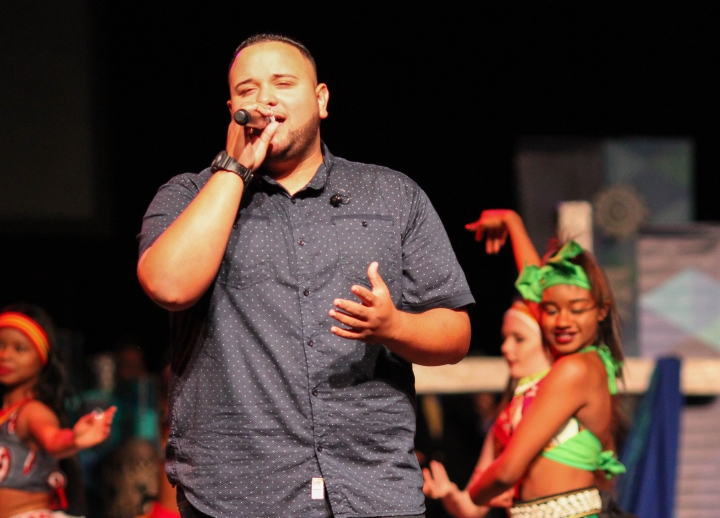news article

Imagine No Malaria celebration rocks the house
May 19, 2016 / By Crystal Caviness and Barbara Dunlap-Berg
“Our God is able!”
Celebrating the success of the Imagine No Malaria initiative, launched in 2008, speakers, singers and dancers offered even more for United Methodists attending General Conference 2016 to imagine – Abundant Health: Our Promise to Children.
“Health is the ultimate design of God for humanity,” said Bishop Thomas Bickerton, Imagine No Malaria chair. “Health and wholeness have been a hope for Methodists since John Wesley got on a horse in 18th-century England to preach about the love of God and the meaning of faith in Jesus Christ.
“What began with the bite of a mosquito has transformed into a faith-driven global health movement. Together, we have imagined No Malaria. Now let us imagine abundant health.”
The 12-minute celebration was a collaboration between United Methodist Communications and the United Methodist Board of Global Ministries. It featured a highlights video of the grassroots campaign that has engaged donors of all ages, showcased the impact of the initiative on the continent of Africa and debuted “Able,” a song commissioned by Imagine No Malaria as a gift to United Methodists across the globe. Jeremy Rosado, a Top 12 contestant on “American Idol,” performed the song for more than 1,000 people attending the event. The song is available as a free download at Amazon Music and the Imagine No Malaria website, as well as on YouTube.
'Abundant Health: Our Promise to Children'
Noting that worldwide 6 million children die every year from preventable diseases, the report introduced the next step – an effort to reach a million children with lifesaving and health-promoting measures by the next time General Conference convenes in 2020.
Building on the success of Imagine No Malaria, the Abundant Health program seeks to engage at least 10,000 U.S. churches in programs that encourage promoting physical activities, healthy diet and nutrition, education for tobacco- and drug-free living and mental health education.
“We've imagined no malaria; now let us imagine abundant health,” said Thomas Kemper, Global Ministries top executive.
Dr. Olusimbo Ige, executive director of General Ministries’ Global Health program, said a lack of abundant health “is not only when you are sick. It can also mean that your potential for good health is not fully realized. We want to connect with every child in every place, and we are calling on every church and every individual to join us in this effort.”
Abundant Health is being coordinated by the United Methodist Board of Global Ministries, with the goal of reaching 1 million children with life-saving interventions by 2020. It will initially focus on Democratic Republic of Congo, Haiti, Liberia, Mozambique and Nigeria, Ige said later. She also expressed concern about the United States, where she said childhood obesity has more than doubled in the last 30 years.
“We are calling on the church to engage here in the U.S. and also to support the global effort to reach children internationally,” she said.
Joining church leadership onstage was Christoph Benn, director of external relations at the Global Fund to Fight AIDS, Tuberculosis and Malaria in Geneva. In 2010, the Global Fund and Imagine No Malaria joined forces in the fight against malaria. Today, The United Methodist Church is one of the most significant non-government donors to the Global Fund and is unique within the global community of faith-based organizations.
To date, the people of The United Methodist Church have raised more than $68 million to end malaria deaths in sub-Saharan Africa, where one child dies from malaria every two minutes. The Imagine No Malaria campaign aims to raise $75 million to address the impact of malaria in Africa through prevention, treatment, communication and education.
Speakers, on video, shared their stories. “My daughter and my wife died from malaria,” said Bishop Gabriel Yemba Unda of Democratic Republic of Congo.
“I lost my father to malaria,” added Bishop Joaquina Filipe Nhanala of Mozambique.
“I have seen too many of our family suffer because of malaria,” said the Rev. Gary Henderson, executive director of Imagine No Malaria at United Methodist Communications.
Waving colorful streamers, brightly clad dancers wove through the plenary hall aisles as Rosado led an energized congregation to “take a stand and … show the world what we believe in.”
“Can you believe it?” he asked. “We’ve seen malaria deaths cut in half. We’ve seen a stronger church as we’ve worked together. We’ve seen lives transformed because God is able to do more than we can ever ask or imagine!”
“Today has been an incredible celebration of what God has done through the unified effort of the people of The United Methodist Church,” said Bickerton. “Imagine No Malaria has been successful because of how it energized people who got excited about saving people’s lives. And today, we rejoiced in that success and the people who have made it possible.”
Better together
In a press briefing, Benn said the partnership with The United Methodist Church “has been such a model” for partnerships with faith organizations. The church has become recognized by other major partners, working in settings with leaders from government, the U.N. and the private sector. “This has now inspired other faith communities,” he said.
“Ideally, I would like to see an ecumenical network on these issues,” he added.
Henderson said Imagine No Malaria has been an effort of the whole church and is evidence of how “we’re better together.”
“We dreamed a really big dream,” he said, “and the dream became possible because many hands came together.”
Caviness is a public relations specialist and Dunlap-Berg is a general church content editor at United Methodist Communications, Nashville, Tennessee.